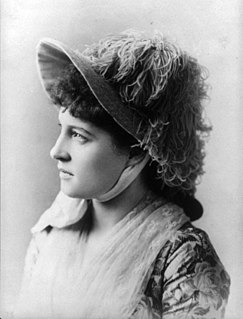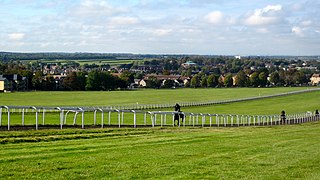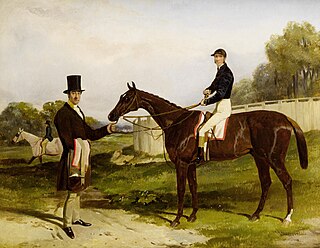Moulton Paddocks is a racing stable in Newmarket, Suffolk, UK operated by Godolphin Racing. It is said to have the capacity for around 200 horses, many of which are of extremely high quality. The stable is currently run by Charlie Appleby.
Contents

Moulton Paddocks is a racing stable in Newmarket, Suffolk, UK operated by Godolphin Racing. It is said to have the capacity for around 200 horses, many of which are of extremely high quality. The stable is currently run by Charlie Appleby.

At one time Moulton Paddocks was known as Fidget Hall, [1] a possible reference to Sam Chifney's Fidget Farm of 70 acres situated at the extremity of the Bury Hill gallop. He named the farm after the sire of a horse he had ridden when young. [2] Owners of Moulton Paddocks have since included: Sir Robert Pigot, Lord William Cansfield Gerard, George Alexander Baird, Sir Ernest Cassel and Solly Joel.
In 1841 Fidget Hall was 64 acres and owned by George Samuel Ford, [3] known in the racing fraternity as "Lawyer Ford". [4] He was a financier to gentlemen and noblemen in distress, [5] and one of the creditors of the bankrupt trainer Will Chifney - brother of Sam. [6] Ford was passionately fond of racing: his horse Poison won the 1843 Oaks [7] and Guaracha won the Coronation Stakes in 1846.
In 1842 William Webber, surgeon and founder of the Norwich Royal Free Hospital for Incurables, [8] owned Fidget Hall. [9] He carried out extensive building work on the property and increased the size of the estate to 313 acres. During this period the name changed from Fidget Hall to Moulton Paddocks. Webber bred race horses and in 1842 the stallion Erymus stood at Moulton Paddocks but died there in January 1847. [10] In 1849 Sir Robert Pigot leased the property from Webber; two of his children were later born there in 1850 and 1852. [11]
Mr Willingham Franklin purchased Moulton Paddocks from Webber in 1857, but sold in 1859 (shortly before he died). Franklin, described as “barrister not in practice”, was the only son of Sir Willingham Franklin (a judge in the supreme court at Madras) and nephew of explorer John Franklin. In 1861 the property was occupied by Captain Astley Paston Cooper, who inherited a baronetcy in 1866 when his father -Sir Astley Paston Cooper, 2nd Baronet - died. [12]
From the early 1860s, Moulton Paddocks belonged to the Fryer family. They more than doubled the area of land and improved the house before selling to Lord Gerard in 1885. In 1889 Gerard leased the great horse Ormonde from the Duke of Westminster to stand at Moulton Paddocks. However, the horse was ill and the fertility of the animal so poor that only one foal resulted. [13]
Gerard sold Moulton Paddocks to George Alexander Baird in 1892 who moved his stud from Kentford. It was thought that he would also move his Bedford Lodge operation to Moulton Paddocks, but he died the following year. Lillie Langtry the actress was in a relationship with Baird at this time and she would have stayed at Moulton Paddocks. Langtry had a small number of horses in training at Baird's stable and after his death moved them to Kentford - about 3 miles from Moulton Paddocks. She gradually became more interested in racing, purchased additional horses, and in 1895 bought a house in Kentford called Regal Lodge.
Baird's executors let Moulton Paddocks on short leases until they found a buyer, and in 1899 Ernest Cassel took ownership. Cassel had become financial adviser to the Prince of Wales in 1897 and the two developed a close friendship. In 1892, the Prince had been persuaded by his racing manager to move his horses from John Porter’s stables at Kingsclere to those of Richard Marsh at Newmarket. This new arrangement was convenient for the royal residence of Sandringham House and when Cassel purchased Moulton Paddocks the Prince (and later when he was Edward VII) became a frequent visitor. [14] By the time of Cassel's death in 1921, the Moulton Paddocks estate had been expanded to 1300 acres.
Solly Joel became the owner in 1922 after the death of Cassel. He and his brother Jack Joel had a long running rivalry on the turf as owners, with Jack having the greater success over the years. [15] When Solly purchased Moulton Paddocks, he already had a well established stud at Maiden Erlegh near Reading, Berkshire. He used the stables at Moulton Paddocks to train under Walter Earl. When Joel died in 1931 the estate passed to his son Dudley. After his death in 1941 the house fell into dis-repair and by 1950 had been demolished. [16]

Emilie Charlotte Langtry, known as LillieLangtry and nicknamed "The Jersey Lily", was a British socialite, actress and producer.

Newmarket is a market town in the English county of Suffolk, approximately 65 miles north of London. It is generally considered the birthplace and global centre of thoroughbred horse racing. It is a major local business cluster, with annual investment rivalling that of the Cambridge Science Park, the other major cluster in the region. It is the largest racehorse training centre in Britain, the largest racehorse breeding centre in the country, home to most major British horseracing institutions, and a key global centre for horse health. Two Classic races, and an additional three British Champions Series races are held at Newmarket every year. The town has had close royal connections since the time of James I, who built a palace there, and was also a base for Charles I, Charles II, and most monarchs since. The current monarch, Queen Elizabeth II, visits the town often to see her horses in training.

Godolphin is the Maktoum family's private Thoroughbred horseracing stable and was named in honour of the Godolphin Arabian, who came from the desert to become one of the three founding stallions of the modern Thoroughbred. Godolphin is buried at Wandlebury Park in Cambridge, where there is a stone to commemorate this horse in the passageway of the old buildings.
Dudley Jack Barnato Joel was a British businessman and Conservative Party politician.

Solomon Barnato "Solly" Joel, born in London, England, moved to South Africa in the 1880s where he made his fortune in connection with diamonds, later becoming a financier with interests in mining, brewing and railways.

Darley Stud is located at Dalham Hall, the global breeding operation owned by Sheikh Mohammed bin Rashid al-Maktoum, the Ruler of Dubai and vice-president of the United Arab Emirates. It is on the outskirts of Newmarket, Suffolk, the international headquarters and historic home of thoroughbred horse racing.

Royal Palace (1964–1991) was a British Thoroughbred racehorse. In a racing career which lasted from June 1966 until July 1968 he ran eleven times and won nine races. After being rated the best English-trained two-year-old of 1966, he won the first two legs of the Triple Crown, the 2000 Guineas and the Derby in 1967. He returned for an unbeaten four-year-old season in 1968 when he won four races which are now Group One events.

The Bury Road in the horse racing town of Newmarket, Suffolk in England is the road along which a number of major stables were built in the 19th and 20th Centuries. It is one of the three main roads along which racing stables have been built, the others being the Fordham Road and Hamilton Road.

Sailor (1817–1820) was a British Thoroughbred racehorse. In a brief racing career in the spring and summer of 1820 he won both of his races including The Derby. He collapsed and died on the Newmarket gallops shortly after his Derby win.

Waxy was a British Thoroughbred racehorse that won the 1793 Epsom Derby and was an influential sire in the late eighteenth and early part of the nineteenth century. Waxy was bred by Sir Ferdinando Poole and was foaled at Lewes in 1790. He was sired by Pot-8-Os, a son of the foundation stallion Eclipse, whose genetic lineage traced to the Darley Arabian. Waxy's dam, Maria, was sired by the influential stallion Herod and produced one full-brother to Waxy, who was named Worthy. Waxy derived his name from a variety of potato, a choice that was inspired by his sire's name. Trained by Robert Robson, Waxy won nine races out of 15 starts during his four-year racing career, retiring from racing at the age of seven in 1797 after sustaining an injury during his last start.

Priam (1827–1847) was a British Thoroughbred racehorse and sire. In a career that lasted from April 1830 to July 1832 he ran nineteen times and won seventeen races, including four walkovers. Unraced as a two-year-old he won seven of his eight starts in 1830 most notably The Derby. He continued to win major races, including successive runnings of the Goodwood Cup for the next two seasons before being retired to stud. He proved to be a successful sire of winners in both Britain and the United States. Priam was regarded by experts as one of the best horses to have raced in England up to that time.

Skyscraper (1786–1807) was a British Thoroughbred racehorse. One of many notable offspring of the great Highflyer, Skyscraper is best known for winning The Derby of 1789. He competed until he was seven, when after losing two races he was retired to stud.

George Alexander Baird was a wealthy British race horse owner, breeder and the most successful amateur jockey of his day, who rode under the assumed name of Mr Abington. He was a controversial figure, at times in conflict with the establishment, "warned off" for his aggressive riding behaviour, implicated in a prize fight fixing scandal. and named as co-respondent in two divorce cases. He had a relationship with Lillie Langtry, noted actress and former mistress of the Prince of Wales. Baird died at age thirty-three of pneumonia in a hotel room in New Orleans, Louisiana, after traveling there for prize fights with men he sponsored.

Captain James Octavius Machell (1837–1902) was an influential figure in British horse racing during the final decades of the 19th century. He was a respected judge of horses and an astute and highly successful gambler. During a career that lasted almost forty years he managed and trained eleven English classic winners and was himself the owner of a record three Grand National winners.

Sir George Chetwynd, 4th Baronet of Brocton Hall was the heir to the Chetwynd baronetcy upon the death of his father in 1869.
William Webber (1800–1875) was a surgeon who founded the Norwich Royal Free Hospital for Incurables. He was elected a Fellow of the Royal College of Surgeons but, on a matter of principle, refused to sign the acceptance declaration. He was said to be always a ‘man with a grievance’, and in later life ended up in debtors’ prison for failing to pay the damages from a libel case that he had lost.
George Samuel Ford (1790–1868) was a bill discounter and solicitor who took interest in the financial affairs of many gentlemen of the period including the Lords Lichfield, Chesterfield, Suffield and the Count d'Orsay. A passionate follower of the turf, he was known in horseracing circles as "Lawyer Ford".
Walter Earl (1890–1950) was a British Thoroughbred racehorse trainer. After a riding career of limited importance he became a private trainer, first for Solomon Joel and later for Lord Derby. He was one of the most successful trainers of the 1940s, sending out the winners of six classics and winning the title of Champion Trainer in 1945. His best horse was Alycidon who won the Ascot Gold Cup in 1949.
Charlie Appleby is a British thoroughbred racehorse trainer who is employed by Godolphin and trains horses at their Moulton Paddocks stable in Newmarket, Suffolk. He is the World Trainer of 2021 in the TRC Global Rankings and the British flat racing Champion Trainer in the 2021 season.

Frank Butler (1817-1856) was an English jockey who became one of the country's top riders. In a period of about 11 years he won The Derby twice, The Oaks on six occasions, the Two Thousand Guineas twice, the One Thousand Guineas twice, the St Leger, the Goodwood Cup on three occasions and the Triple Crown on West Australian. In his final years of racing he won 143 races from 384 starts. Illness forced him to stop riding in 1854 and he died two years later at the age of 39.